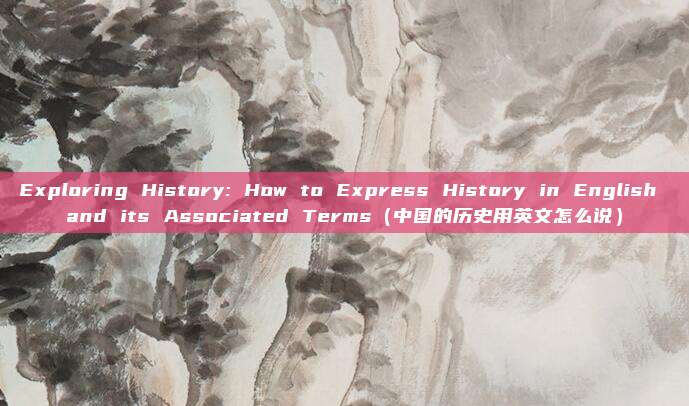Exploring History: How to Express History in English and its Associated Terms(中国的历史用英文怎么说)
温馨提示:这篇文章已超过267天没有更新,请注意相关的内容是否还可用!
Introduction:
History is a fundamental aspect of human life and culture. It shapes our understanding of the world, informs our decisions, and provides valuable insights into the past. Whether you are writing a research paper, a blog post, or a casual conversation, it is essential to know how to express "history" in English accurately and effectively. In this article, we will explore the various ways to express "history" in English and its associated terms.
The term "history" itself is the most straightforward way to express the subject. It originates from the Greek word "historia," meaning inquiry or knowledge acquired by investigation. The following are some common synonyms and related terms for "history" in English:
1、Past

The term "past" refers to the time that has already occurred. It is a general term that can encompass all historical events but is often used to denote events that happened a long time ago.
2、Ancient history
Ancient history focuses on events and periods that occurred before the classical period, usually referring to the distant past, such as the era of ancient Greece, Rome, or Egypt.
3、Medieval history
Medieval history covers the period between the fall of the Roman Empire and the beginning of the Renaissance, approximately from the 5th to the 15th century.
4、Modern history
Modern history refers to the period from the Renaissance to the present day. It is often used to describe events and movements that have had a significant impact on the modern world.
5、Recent history
Recent history is a more specific term used to describe events that have occurred within the last few decades. It often includes contemporary issues and events that are still unfolding.
6、Historical events
This term is used to describe specific occurrences in history that have had a significant impact on the world or a particular region.
7、Period in history
A period in history refers to a specific time span within a broader historical context, characterized by distinctive events, trends, or characteristics.
8、Chronological order
Chronological order is the arrangement of events in the order in which they occurred. It is essential for understanding the sequence of historical events.
9、Timeline
A timeline is a visual representation of historical events arranged in chronological order. It is a useful tool for visualizing and analyzing historical developments.
10、Epoch
An epoch is a period in time that is characterized by specific characteristics, such as technological advancements, social changes, or political events.
Conclusion:
Understanding how to express "history" in English and its associated terms is crucial for clear and effective communication. By utilizing the right words, you can convey your message more accurately and engage your audience better. Whether you are a student, writer, or enthusiast of history, familiarizing yourself with these terms will undoubtedly enhance your knowledge and appreciation of the past.
网站文章、图片来源于网络,以不营利的目的分享经验知识,版权归原作者所有。如有侵权请联系删除!





还没有评论,来说两句吧...